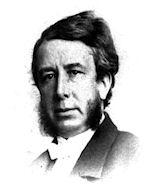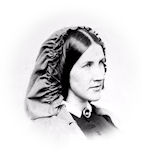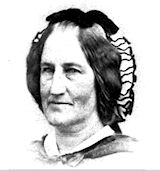Georgeanna Muirson Woolsey writes:
Washington, July 22, 1861.
My dear Cousin Margaret: This is the third attempt I have made to finish a letter to you. Joe is safe and quietly sleeping on the sofa by us. You know all about this total defeat—our army is entirely broken up, all the army stores, three of the batteries, ammunition, baggage, everything, in the hands of the enemy—Centreville retaken by them, Fairfax C. H. retaken, and our troops scattered in and about Washington. Everything was in our hands and success seemed certain at Bull Run, when from some cause or other a panic was created, our men fell back, the rebels seized the moment for a bold rush and we were entirely routed. Joe says there never was a more complete defeat. All last night the soldiers were arriving in all sorts of conveyances, and on horses cut from ambulances and baggage wagons. An officer from Bull Run told us he saw four soldiers on one horse; and so they came flying back to Washington in all directions. Colonel Miles’ division, in which Joe’s regiment was, was held as a reserve at Blackburn’s Ford on the left and only came into active duty when the rout began—they had a sharp engagement with 5000 in a “gully” lost only two men from the Brigade and none from the 16th and retired in order, first to Centerville, where orders met them to fall back on Fairfax C. H. Here they slept half an hour last night, when they were again ordered to retreat to Washington, which order they have followed as far as Alexandria, and expect now to be stationed there some little time. The dead and wounded were left in the hands of the enemy, and one of the officers told me it would be unnecessary to ask for the sick, for the rebels were killing them: he knew it had been done in some cases, and undoubtedly would be in all. Colonel Davies and two of the officers came up from their camp at Alexandria with Joe, and all four of them were wretched-looking men, dirty, hungry and utterly tired out. Joe had not had his high boots off since he left Alexandria on the 16th. The day that McDowell’s division marched south, Eliza and I were out at the camp to see them pass, and our own regiment march. Eleven thousand fine-looking fellows filed past us as we stood at the cross-roads,—and disappeared down the quiet country lane. What a horrid coming back it has been! “We shall not see this place very soon again,” they said as they packed up their things at Alexandria, and marched off, singing as they went. And in spite of all this, and in full knowledge of the great outnumbering of our men on the other side, General Scott sat quietly in St. John’s Church that battle-Sunday through a tremendously heavy sermon, shook hands with me at the church door, and told us all that “we should have good news in the morning and that we were sure to beat the enemy.” Colonel Davies has seen him this morning too, and he is quite cheerful and composed. The Zouaves, one Massachusetts regiment, and the 69th and 71st New York have been the greatest sufferers—very few of the Zouaves are left. The fighting was all from behind masked batteries on the enemy’s side. Lieutenant Bradford told me that he had to ride down the lines and give the order to retreat. Our men were all lying on their faces, and the air filled with shot and shell and not a rebel’s head to be seen. When Colonel Davies was asked what lost the day, he said “green leaves and fine officering on the enemy’s side.” In open field, they all say they should have beaten the rebels entirely. . . . Now he and Joe are off on business in a hard rain, and go to Alexandria at two, where the regiment is established in the old camp—at Cameron Run. Yesterday and last night were hard to bear, but what with General Scott’s assurances, General Ripley’s, Mr. Dixon’s and Judge Davies’ comforting little visits, we got along, jumping up every few moments through the night whenever a horse dashed by the house or an ambulance rumbled along. Now we shall be as much as possible at the camp in Alexandria,—for how long I can’t say. . . . We have had an encounter with Miss Dix—that is rather the way to express it. Splendid as her career has been, she would succeed better with more graciousness of manner. However, we brought her to terms, and shall get along better.

Eliza adds, also to Cousin Margaret:
The sick and wounded are doing well. Georgy and I have been to all the hospitals and find them very well supplied, for boxes of garments and stores of all kinds have poured in ever since the battle. It has been the one cheering thing of the times. . . . We hear from the surgeons we have met here that very many of the wounded who were left behind had their wounds carefully dressed before the rout began, and they are constantly being brought into the city in ambulances, having reached the camps on the other side by slow stages.

– – – – – – – – –
In this same battle of Bull Run the 2d Conn. was in the thick of the fight, and its surgeon, Dr. Bacon (your Uncle Frank), found himself separated from the troops and in the midst of a group of southern wounded, for whom he cared under the impression that we were victorious and he within our own lines. He ordered them to surrender their arms, threw most of these into a pond near by, and saved a pistol and two dangerous knives as trophies. They are those that afterwards hung on the banisters of his house in New Haven. One of the knives was more than a foot long and home-made from a horse shoer’s file, with rough home-made scabbard; the other, an ugly dirk, was made in England and engraved there “Arkansas toothpick.” The revolver belonged to the wounded commanding officer, Lieutenant-Colonel Gardner, leading a Georgia regiment. He insisted upon giving his watch to Dr. B. as a return for the good care received.—(It was afterwards returned to him.)—When the arms were in the horse pond and the rebels cared for, the Doctor made the startling discovery that he was alone—our army in retreat, and he virtually a prisoner to the rebels. He left hastily, before the truth dawned upon Colonel Gardner’s mind!












